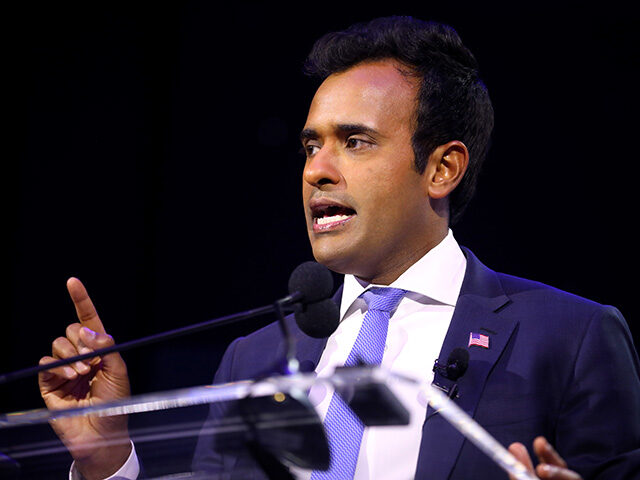President Donald Trump’s MAGA supporters and his Silicon Valley donors are suddenly fighting online about investors’ policy of importing a huge number of foreign graduates for career-starting professional jobs in Fortune 500 companies.
On December 27, Vivek Ramaswamy super-charged the dispute by arguing that Americans must adopt a more aggressive and competitive culture:
Our American culture has venerated mediocrity over excellence for way too long (at least since the 90s and likely longer). That doesn’t start in college, it starts YOUNG.
…
“Normalcy” doesn’t cut it in a hyper-competitive global market for technical talent. And if we pretend like it does, we’ll have our asses handed to us by China.
This can be our Sputnik moment. We’ve awaken from slumber before & we can do it again. Trump’s election hopefully marks the beginning of a new golden era in America, but only if our culture fully wakes up. A culture that once again prioritizes achievement over normalcy; excellence over mediocrity; nerdiness over conformity; hard work over laziness.
His tweet generated vehement opposition, including from Alicia Silverwood, who has tracked how many Fortune 500 companies dodge federal law and norms to hire lower-wage, lower-skill, and subordinate white-collar migrants instead of young, outspoken American professionals:
This is the rhetoric of someone who doesn’t care about America or its people … You’ve revealed yourself as a wolf in sheep’s clothing, siding with those who exploit, suppress wages, and displace hardworking Americans, all while pretending to champion innovation. The truth is, you are the problem, helping the very forces destroying the middle class, undermining. American sovereignty, and stripping away opportunities from citizens.
But there is much room for cooperation, even compromise, between the investors and the Americans who oppose the mass inflow of foreign graduates, say observers.
“I don’t think that [Ramaswamy] probably thought he was stepping on a landmine to the degree he was,” said Jeremy Carl, a former Stanford academic, an author, a former deputy assistant secretary of the interior during the Trump Administration, now at the Claremont Institute.
“The MAGA base is not signing up for that, and it’s going to be something that we are going to have to work through … What I would say to some of the tech right is let’s work together on doing that.”
“At the end of the day, political alliances are always messy and complicated and involve a variety of people with competing interests,” he said, adding:
The Silicon Valley guys, they bring a lot of talent, they bring a lot of IQ, they bring a lot of money, they bring a lot of cultural influence, to a [MAGA] movement that needs a lot of that just given the way power politics works … What’s sort of happening on Twitter right now is folks are really trying to lay down what the terms of that fight going to be.
“That’s totally reasonable,” he added.
The fight over white-collar migration was kicked off by a December 23 tweet from U.S. Tech Workers which prompted hardline condemnation from pro-Trump investors in Silicon Valley, including Elon Musk.
However several of those investors quickly backtracked — and suggested future cooperation with Americans who oppose mass migration into white-collar jobs.
The December 23 tweet from U.S. Tech Workers slammed the appointment of Indian immigrant Sriram Krishnan to the White House’s Office of Science and Technology. His “pet issue is expanding the H-1B visa program and removing country cap quotas for Green Cards,” said the group, which opposes the large-scale inflow into the white-collar tech jobs held by Americans.
The tweet was slammed by David Sacks, who has been appointed as White House advisor for artificial intelligence. He posted: “Hard to say what’s going on here, but it seems like a division grift if I’ve ever seen one.”
On December 25, Sacks stepped back: “I completely trust @StephenM to handle immigration policy in the White House. What I oppose is a baseless witch hunt against a highly qualified American for a role as A.I. adviser.”
On December 24, investor Joe Lonsdale defended Krishnan, saying: “We need to recruit the best and brightest [migrants] and build the best companies.” Two days later, he tweeted “Illegal immigration is a 25X bigger issue, let’s go hard on it.”
Elon Musk seemed to perform a reversal after a December 25 tweet where he portrayed Americans as discardable members of an economic team:
The number of people who are super talented engineers AND super motivated in the USA is far too low. Think of this like a pro sports team: if you want your TEAM to win the championship, you need to recruit top talent wherever they may be. That enables the whole TEAM to win.
But Musk tweeted on December 26: “Maybe this is a helpful clarification: I am referring to bringing in via legal immigration the top ~0.1% of engineering talent as being essential for America to keep winning,”
Libertarian supporters of mass migration, however, derided the opposition to the investors’ use of foreign workers. “Purge the chuds for being against Indian immigration [so] they won’t be here to try and stop people from getting vaccinated next time there’s a pandemic,” tweeted author Richard Hanania.
The online explosion underlined the deep differences between the tech investors’ global-minded focus on economic payoffs — often via migration — and the hostility of many Americans towards the white-collar migration that has hammered the American professional sector amid media silence.
The conflict has been building since 1990 when tech companies began importing millions of mid-skill foreign graduates, mostly Indian.
That mass inflow of -IB visa workers chopped salaries and career opportunities for millions of American graduates. Since 2008, the salaries for American tech graduates have remained flat, even as companies’ stock values have rocketed upwards.
Under President Joe Biden, the inflow of foreign workers has kept rising because his deputies have welcomed more white-collar migrants through the uncapped H-1B, J-1, L-1, H4EAD, TN, O-1, OPT, and CPT work-permit programs.
Currently, foreign visa workers hold at least 1.5 million white-collar jobs — and roughly three million have already got the deferred bonus of green cards, citizenship, and a career in a sector once dominated by the Americans who created the sector.
The inflow of tech migrants also helped companies to outsource millions of professionals’ jobs to India and other countries where wages are low and regulatory compliance is modest.


